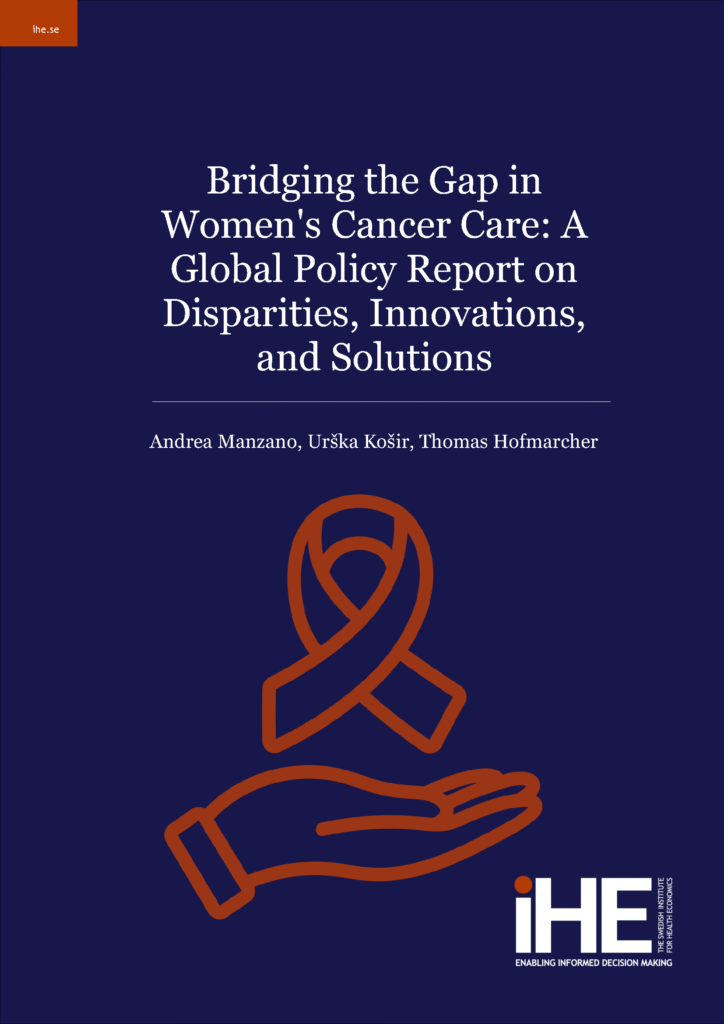IGCS CEO, Mary Eiken was invited to co-host a high-level roundtable during the United Nations General Assembly (UNGA) on September 24, 2025. The event, Transforming recommendations into impact: advancing women's cancer care, marks the release of the Swedish Institute for Health Economics (IHE) report, “Bridging the Gap in Women’s Cancer Care: A Global Policy Report on Disparities, Innovations, and Solutions.”
The report demonstrates that women’s cancers are solvable. Treatments exist, but access remains the greatest barrier. It shows that investing in women’s cancer care yields significant health and economic benefits, yet calls for equitable scaling of diagnostics and treatments and for women’s cancers to remain a priority on local, national, and global agendas.
IGCS Influence Grows in Global Policy Discussions
Increasingly, IGCS is being invited to contribute to these types of global policy discussions and weigh in on documents and recommendations aimed at improving equitable cancer care worldwide. This recognition is closely tied to the Society’s growth over the last decade, as our diverse and expanding membership now represents a truly global body of experts and stakeholders in gynecologic oncology. With this breadth of expertise, IGCS is uniquely positioned to influence international recommendations that have a real effect on local care. This momentum reflects not only the growth of the organization, but also the advancement of a core IGCS strategic pillar: increasing our impact worldwide.
This report reflects the contributions of IGCS Members, whose perspectives and expertise helped shape its recommendations. Your voices are being heard on one of the world’s most influential stages. IGCS representatives contributing to the report include:
- Abhishek Shankar — Radiation Oncologist, All India Institute of Medical Sciences (AIIMS), Delhi, India; Vice-Chair, Advocacy Committee, IGCS
- Frances Reid — Programme Director, World Ovarian Cancer Coalition, Stevenage, UK
- Heleen van Beekhuizen — Gynecologic Oncologist, Erasmus University, Rotterdam, Netherlands; Member, IGCS Cervical Cancer Elimination Work Group
- Mupeta Songwe — Pathologist, University Teaching Hospital, Ministry of Health, Lusaka, Zambia
- Ros Glasspool — Consultant Medical Oncologist and Honorary Clinical Senior Lecturer, Glasgow, UK; Chair, Advocacy Committee, IGCS
United Nations General Assembly: Closed Roundtable
With the UN High-Level Meeting on non-communicable diseases (NCDs) taking place in parallel, the timing of this event on September 24, 2025, underscores the importance of leveraging the “NCD moment” to keep women’s cancers at the forefront of global health policy.
At the roundtable, Mary Eiken will join government officials, civil society leaders, and healthcare experts to explore how we can keep women’s cancers on the agenda, even in a time when policymakers’ attention and resources are stretched thin. The closed roundtable will convene 20–30 leaders, including:
- Government officials such as Dr. Mohamed Hassani, Assistant Minister of Health for Projects and Public Health Initiatives, Egypt
- Civil society organizations including the Clinton Health Access Initiative and the Sabin Vaccine Institute
- Healthcare delivery experts from the Global Surgery Foundation
- Cancer specialists from around the world
The objectives of the roundtable are to:
- Share the report’s findings
- Strategize how to use the NCD spotlight to drive change for women’s cancers
- Explore opportunities for collaboration across sectors
This is an extraordinary opportunity to advance the global prioritization of women’s cancers, and we are grateful to represent IGCS and our community in this vital discussion.
Report title: Bridging the gap in women’s cancers care: a global policy report on disparities, innovations and solutions.
Authors: Andrea Manzano, Urška Košir, Thomas Hofmarcher
Summary:
Women’s cancers – breast, cervical, ovarian, and uterine – represent a large and growing challenge worldwide. In 2022, 3.7 million women were diagnosed and 1.3 million lost their lives, with the burden projected to rise by more than 50% by 2050, particularly in low- and middle-income countries. Beyond the health impact, these cancers carry profound social and economic consequences, as women often balance the dual role of patient and caregiver, face stigma, and shoulder high out-of-pocket costs. The report highlights that while powerful tools to address the burden of women’s cancers already exist – HPV vaccination, screening, advanced diagnostics, new therapies – access remains deeply unequal, with survival rates for the same cancers varying considerably between high- and low-income settings.
Investing in women’s cancers is not only a health priority but also a smart economic strategy: every dollar spent on prevention, early detection, and treatment can return multiple times in societal and economic benefits. The report outlines a roadmap of policy recommendations – from scaling prevention and screening to strengthening cancer systems and leveraging innovation equitably – and underscores the need for global frameworks that address all four women’s cancers. Ensuring that women everywhere have access to effective and affordable cancer care is both a matter of equity and a catalyst for stronger, more resilient societies.
The work on the report was led by researchers at IHE – The Swedish Institute for Health Economics, with support from experts affiliated with the Advanced Breast Cancer (ABC) Global Alliance and the International Society of Gynecologic Cancer (IGCS). The report was launched on the sidelines of the 80th session of the UN General Assembly (UNGA 80) at a high-level roundtable meeting in New York City in September 2025.

 login/create account
login/create account Donate
Donate


